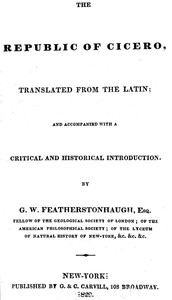The republic of Cicero by Marcus Tullius Cicero
"The republic of Cicero" by Marcus Tullius Cicero is a philosophical dialogue written between 54 and 51 BC. Modeled after Plato's Republic, it examines Roman constitutional theory through conversations led by the wise statesman Scipio Aemilianus. The work explores different types of government, the role of justice in politics, and the qualities of ideal citizens. Though much of the text is lost, its surviving portions reveal Cicero's vision of Roman politics and
conclude with the famous Dream of Scipio. (This is an automatically generated summary.)
Read or download for free
| Reading Options | Url | Size | |||
|---|---|---|---|---|---|
| Read now! | https://www.gutenberg.org/ebooks/54161.html.images | 251 kB | |||
| EPUB3 (E-readers incl. Send-to-Kindle) | https://www.gutenberg.org/ebooks/54161.epub3.images | 249 kB | |||
| EPUB (older E-readers) | https://www.gutenberg.org/ebooks/54161.epub.images | 250 kB | |||
| EPUB (no images, older E-readers) | https://www.gutenberg.org/ebooks/54161.epub.noimages | 156 kB | |||
| Kindle | https://www.gutenberg.org/ebooks/54161.kf8.images | 315 kB | |||
| older Kindles | https://www.gutenberg.org/ebooks/54161.kindle.images | 292 kB | |||
| Plain Text UTF-8 | https://www.gutenberg.org/ebooks/54161.txt.utf-8 | 219 kB | |||
| Download HTML (zip) | https://www.gutenberg.org/cache/epub/54161/pg54161-h.zip | 223 kB | |||
| There may be more files related to this item. | |||||
Similar Books
About this eBook
| Author | Cicero, Marcus Tullius, 107 BCE-44 BCE |
|---|---|
| Translator | Featherstonhaugh, George William, 1780-1866 |
| LoC No. | 44020946 |
| Uniform Title | De republica. English |
| Title |
The republic of Cicero Translated from the Latin; and Accompanied With a Critical and Historical Introduction. |
| Note | Wikipedia page about this book: en.wikipedia.org/wiki/De_re_publica |
| Credits |
Produced by Richard Tonsing and the Online Distributed Proofreading Team at www.pgdp.net (This file was produced from images generously made available by The Internet Archive) |
| Reading Level | Reading ease score: 60.6 (8th & 9th grade). Neither easy nor difficult to read. |
| Language | English |
| LoC Class | PA: Language and Literatures: Classical Languages and Literature |
| Subject | Political science -- Early works to 1800 |
| Subject | State, The -- Early works to 1800 |
| Category | Text |
| EBook-No. | 54161 |
| Release Date | Feb 12, 2017 |
| Most Recently Updated | Oct 23, 2024 |
| Copyright Status | Public domain in the USA. |
| Downloads | 1751 downloads in the last 30 days. |
| Project Gutenberg eBooks are always free! | |

